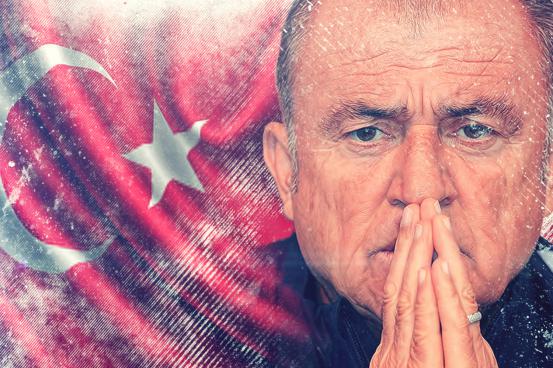- Commissioner’s statement on Ventura, Marte
- Ronnie O’Sullivan: Masters champion ‘felt so vulnerable’ in final
- Arron Fletcher Wins 2017 WSOP International Circuit Marrakech Main Event ($140,224)
- Smith challenges Warner to go big in India
- Moncada No. 1 on MLB Pipeline’s Top 10 2B Prospects list
- Braves land 2 on MLB Pipeline’s Top 10 2B Prospects list
- Kingery makes MLB Pipeline’s Top 10 2B Prospects list
- New Zealand wrap up 2-0 after Bangladesh implosion
- Mathews, Pradeep, Gunathilaka to return to Sri Lanka
- Elliott hopes for rain for Poli
Fatih Terim Draws on History to Build Turkey’s Euro 2016 Master Plan
- Updated: May 31, 2016

Fatih Terim’s attention to detail is legendary. So the most striking thing when sitting down in his office at the Turkiye Futbol Federasyonu’s elegant but understated headquarters—set in a quiet corner of Istanbul’s Besiktas district—is how few clues exist to a career stuffed full of drama and accomplishment.
It’s minimalist, with three sofas in a half-circle in front of his desk, which faces a huge plasma TV that’s replaying Barcelona’s demolition of Celta Vigo.
This is where Turkey’s plans for Euro 2016—their first major tournament in eight years—will be hatched. Few surprises will be involved. Terim’s approach will be typically attacking. “Aiming to do as well as we can, and even to try to win it,” he says.
After a late surge to qualify, with Selcuk Inan’s dramatic free-kick goal to beat Iceland sealing passage as the third-placed side with the best record, there’s an extra feeling of freshness and possibility about Terim’s Turkey. The decision to play the final home qualifiers in Konya, rather than Istanbul, was “a very important” one that had explicit affect, he argues.
“The crowd in Istanbul are very important to us and always will be,” Terim says. “However, there’s the reality of living in a big city and the challenges it brings. And we thought playing in Istanbul all the time created a sense of satisfaction. You have to remember that we’re talking about the 12th man, an extra player that can make the difference to win the game.
“There were people from all over Turkey there in Konya.”
That sense of national unity, always a central tenet of Terim’s philosophy, was evident as the team overcame the Netherlands and then Iceland.
On the pitch, his principle that fortune favours the brave endures, as it has for more than two decades of coaching. Later, as we talk mostly with the help of a translator, there’s a rare nod to his myriad achievements when he clocks me looking at his hands as he toys with a small purple paperweight on his desk flocked with the red coat of arms of Florence, Italy.
“You recognise this?” he asks in English (Terim is not quite fluent but breaks into it when he wants to emphasise a point).
He may be inextricably linked with the development of modern Turkish football, but Terim’s methods have translated overseas, too.
He made a formidable impression on and off the pitch in less than a season at Fiorentina, building an irresistible team around Rui Costa in 2000-01 before a fallout with owner Vittorio Cecchi Gori. He was subsequently awarded the title of Commendatore OSSI, a form of knighthood given to foreign nationals who make exceptional contributions to Italy.
Terim took plenty from that and his subsequent truncated spell in charge of AC Milan, but he always had broad horizons. He credits much of this to the late Jupp Derwall, the Euro 1980-winning manager with West Germany who later coached Terim at Galatasaray in the twilight of his playing career.
“We were very close,” says Terim, turning his gaze briefly skyward and mouthing “rest in peace” to his mentor, who died in 2007.
“When he was the coach of the German national team and I was the captain of Turkey, we played one another and got to know each other,” Terim says. “When we worked together for a year at Galatasaray, we were like father and son. He always made good choices, and, of course, he really affected Turkish football.”
Before it even got to tactics, Derwall got busy, Terim says: “He started by changing the club’s structure and the pitches [to grass]. Then, after, he brought in training camps, nutrition, more thorough training.”
Yet the aspect of Derwall’s character that appears to have most affected Terim was his humanity, which is evident in his own work.
“He understood that it wasn’t the end of the world to lose a game,” Terim says. “He prioritised the happiness of his players because he understood that a happy player can achieve more. He changed the way football was seen in Turkey and the way Turkish football was seen by those outside.”
Derwall gave Terim a coaching job at Galatasaray after his retirement (Terim had vowed to quit football altogether and spend his time with family). Another German coach, Sepp Piontek, invited Terim to join the Turkey national team. After Piontek left in 1993, Terim took over. Two years into his first spell, he guided Turkey to Euro 96: the team’s first major championship finals since the 1954 World Cup.
“It was a very special tournament for us,” Terim says, “because it was the first time for me and for our country. We needed to get there. I knew it would be very hard [to qualify], but I was thinking about it and dreaming about it. I was thinking about all the times that we failed.
“As a Turkish coach, I knew what was resting on my …
continue reading in source www.bleacherreport.com
